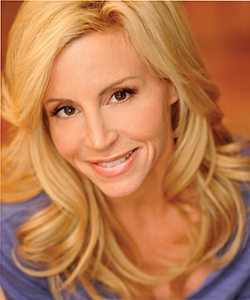Uterine Cancer Survivor
Make Taking Care of Yourself A Priority
Survivor strengthens her mission of patient advocacy after two cancer battles
 Camille Grammer knew she carried a gene mutation that was associated with cancer, but that knowledge didn’t lessen the shock when she was diagnosed with Stage II endometrial cancer. Now she’s cancer-free and passionately encouraging women to take care of themselves by getting checkups and listening to their bodies.
Camille Grammer knew she carried a gene mutation that was associated with cancer, but that knowledge didn’t lessen the shock when she was diagnosed with Stage II endometrial cancer. Now she’s cancer-free and passionately encouraging women to take care of themselves by getting checkups and listening to their bodies.
I have always been diligent about checkups because my grandmother passed away from colon and stomach cancer, and my mother was diagnosed with Stage III ovarian cancer at 47 and is now a cancer survivor. Because of my family history, I had genetic testing and learned I had the mutation for Lynch syndrome, an inherited disorder that increases the risk of many types of cancer.
My doctor estimated my risk at 80 percent, and he went as far as to predict it would be within three years of my mom’s age at diagnosis. He recommended a hysterectomy, but I was only 35 and not ready for the finality that came with that. I had a daughter and a son, but I didn’t know if I was done having children. I couldn’t give up the hope that cancer might skip over me, so I decided to wait on surgery. I had frequent checkups over the next several years that continued to come back with good results.
In June 2013, I had a Pap test that showed abnormal cells so, at 44, I agreed to a hysterectomy. I wanted to wait until after the holidays, so my doctor inserted an IUD in October to help thin my endometrial lining and give me a little relief. As part of the follow-up appointment for that IUD, I had a transvaginal ultrasound. Shockingly, the results showed a 4-millimeter mass. My doctor ordered a biopsy, but the results weren’t conclusive. My doctor then ordered a guided biopsy, and those results showed I had endometrial cancer. I knew it was a possibility, but I was still devastated.
I sought a second opinion at a well-known cancer center in another state. The oncologist told me I had clear-cell carcinoma, a rare and aggressive form of endometrial cancer. My mom was with me when I got the news, and we both started crying. I was overwhelmed, and I relied on her to ask questions and get the information I needed.
I trusted the oncologist, so I followed his treatment recommendations and had a radical hysterectomy that week. I requested robotic laparoscopic surgery. It was still painful, but that technique made my recovery time shorter and easier than if I’d had a traditional hysterectomy. Fortunately, none of my lymph nodes were affected, but the doctor still recommended five weeks of chemoradiation because my cancer was aggressive.
Even though I could have gotten chemoradiation anywhere, I felt comfortable with my care, so I flew back and forth between treatments to be home with my children. It was hard to tell them I was sick, but they were very positive. They’d seen their grandmother survive cancer, which made them confident that I would, too.
The side effects from chemotherapy weren’t bad. I had nausea, but that passed. The radiation therapy, though, was really tough. My doctor prescribed hormone therapy to manage some of the side effects of the radiation.
Not long after I was diagnosed, The Foundation for Women’s Cancer asked if I would be a spokeswoman for the organization and chair its National Race to End Women’s Cancer. I was on board immediately. I am excited to use the platform I have from “The Real Housewives of Beverly Hills” to raise awareness about the importance of taking care of ourselves. Women skip checkups for many reasons, whether it’s fear of what we’ll find or because we get busy and forget about them. I can relate to that. As a single mother, I didn’t have time for cancer either. But remembering to take care of ourselves is what allows us to take care of others.
This experience taught me how helpful it is to have an advocate. My family and close friends were so supportive. I also had survivors reach out to me on social media. They shared stories and coached me through treatment. There is support in numbers!
I’m passionate about sharing information from the patient’s perspective. While I hope my involvement as an advocate helps others, it helps me just as much. Even though I’m nearly three years cancer-free, I still worry about cancer coming back. But, for now, I just keep doing what helped get me through treatment—focusing on my children and being there for them now and for the graduations, weddings and grandchildren to come.
Update: In December 2017, Camille announced she was successfully recuperating from surgery to treat a second cancer diagnosis. This time, it was squamous cell carcinoma. The diagnosis reinforced her message to others about paying attention to the signals our bodies give us. She continues to be a strong advocate for early detection and following up on symptoms as soon as they occur.


